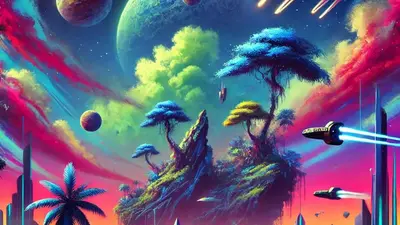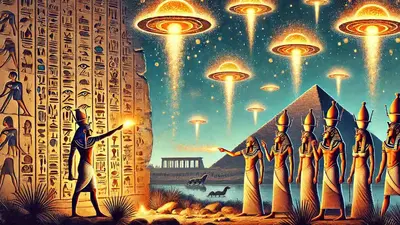
The Simulation Argument: What No Man's Sky Reveals About Our Universe
Have you ever wondered if our world is just a sophisticated game? It's a wild idea, but some believe that the creation of expansive virtual worlds like "No Man's Sky" suggests we might be living in a simulated reality. Let's dive into why this could be true.
The Complexity of Modern Games
Firstly, consider the complexity of games today. "No Man's Sky" has a universe so vast that it’s nearly impossible for anyone to explore entirely. If we can create such intricate worlds, it’s not hard to imagine that a more advanced civilization could create a simulation like our universe.
The level of detail in these games is astounding. Procedural generation, the technology used in "No Man's Sky," creates an almost infinite variety of planets, each with its own unique ecosystems, landscapes, and life forms. This level of complexity, created by human developers, showcases our potential to simulate vast, diverse environments. If we can achieve this, it’s conceivable that a civilization millions of years ahead of us could simulate entire universes, including ours.

Advancements in Artificial Intelligence
Think about the advancements in artificial intelligence. In our games, we interact with NPCs (non-playable characters) that learn and adapt. As our technology improves, these interactions become more lifelike, blurring the line between virtual and real experiences.
Artificial intelligence is evolving rapidly, with NPCs in modern games displaying increasingly sophisticated behaviors. They can respond to player actions in dynamic and unexpected ways, making the gaming experience feel more authentic. This progress hints at the possibility that a sufficiently advanced civilization could create AI so advanced that it mimics real human behavior, creating an illusion of reality that is indistinguishable from our own.
Moreover, AI is not limited to gaming. In everyday life, we see AI in virtual assistants, self-driving cars, and personalized algorithms. These technologies are becoming integral to our lives, shaping our interactions and experiences. If we extend this trajectory into the future, it’s plausible that AI could reach a point where it can simulate consciousness, making the simulated beings in a potential matrix as self-aware and complex as we believe ourselves to be.
Philosophical Arguments
Moreover, the idea of the Matrix isn't just science fiction. Philosophers like Nick Bostrom have argued that future civilizations might run simulations of their ancestors. If this is true, there’s a chance we are living in one of those simulations right now.
David Chalmers, a prominent philosopher of mind, has also explored the simulation hypothesis. He suggests that if we are in a simulation, it would explain some of the fundamental mysteries of our existence, such as the nature of consciousness and the appearance of physical laws. Chalmers posits that our reality could be a high-fidelity simulation, with simulated beings possessing genuine consciousness.
Elon Musk, the tech entrepreneur, has publicly stated his belief in the plausibility of the simulation hypothesis. He argues that given the rapid advancement of technology, particularly in the field of virtual reality and AI, it’s almost certain that we will create simulations indistinguishable from reality. Musk suggests that the odds of us living in base reality (the original, non-simulated world) are extremely low, supporting the idea that we are more likely to be part of a simulated universe created by an advanced civilization.
Mysteries of the Universe
Furthermore, the randomness and mysteries in our universe, such as quantum mechanics and black holes, could be glitches or features of a sophisticated simulation. Just as we encounter bugs in video games, these phenomena might be the results of complex programming beyond our understanding.
Changing Perception of Reality
Lastly, think about how often technology changes our perception of reality. Virtual Reality (VR) and Augmented Reality (AR) are already altering how we experience the world. If this trend continues, the difference between simulated and real experiences might eventually disappear.
Conclusion
In conclusion, while it may sound far-fetched, the idea that we live in a matrix becomes more plausible when we consider our advancements in creating complex virtual worlds. "No Man's Sky" is just one example of how we are pushing the boundaries of what's possible. Maybe, just maybe, we are characters in an incredibly detailed game designed by beings far more advanced than we can imagine.

Recommended

